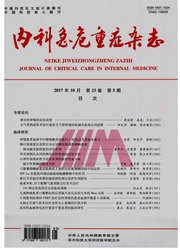

 中文摘要:
中文摘要:
目的:探讨急性中枢神经系统(CNS)损伤与吉兰-巴雷综合征(GBS)并发的临床特征及机制。方法:搜集住院诊断为GBS患者的资料,筛选并总结继发于CNS损伤的GBS患者资料,复习文献,分析2种疾病之间的关系。结果:5年收治GBS共239例,其中继发于CNS损伤后的GBS患者12例(男8,女4),发病年龄42~61岁。患者周围神经损伤的症状继发于原发性或者外伤性中枢神经系统损伤,表现为原发病的基础上出现进行性加重的四肢迟缓性瘫痪、脑干功能异常、反射消失等症状和体征。脑脊液提示蛋白-细胞分离,电生理检查提示周围神经损伤,F波出现率降低,结合病史确诊为不同亚型的GBS。通过复习文献发现CNS损伤与GBS有密切的关系。GBS可以继发于多种中枢神经系统损伤,如脑外伤、出血性脑卒中、脊髓外伤、脊髓相关手术相关操作。而中枢神经系统损伤继发于GBS则以脑梗死多见。结论:两种疾病都是高致残率的神经重症,临床工作需严谨仔细地体格检查,以便尽早地发现病情变化,做到早诊断、早治疗。
 英文摘要:
英文摘要:
Objective:To investigate the clinical characteristics and pathogenesis of acute central nervous system (CNS) injury complicated with Guillain-Barr&233; syndrome (GBS).Methods:The clinical data of GBS patients admitted at Tongji Hospital were collected, those patients who suffered GBS secondary to acute CNS injury were screened, literatures were reviewed, and the relationship between CNS injury and GBS was analyzed.Results:The total number of GBS patients admitted was 239 in 5 years, and the number of GBS secondary to CNS injury was 12 (accounting for 5%), including 8 males and 4 females.Onset age was 42-61 years old and all patients had GBS secondary to primary or traumatic CNS injury.Clinical manifestations were progressive flaccid paralysis, brainstem dysfunction, and weakened or diminished tendon reflexes based on primary CNS diseases.Cerebrospinal fluid results showed protein-cell isolation and electrophysiological examinations showed peripheral nerve injury and decreased F-waves ratio.Combined with the history, 12 patients were diagnosed as different subtypes of GBS.Literature review showed CNS injury and GBS had close relationship and these two diseases may occur successively:GBS secondary to CNS injury and CNS injury secondary to GBS.It is thought GBS secondary to a variety of CNS injury, such as traumatic brain injury, hemorrhage stroke, spinal cord injury or surgery is related to humoral-cell immune imbalances under stress state and inflammatory nerve root injury induced by blood components penetration.Cerebral infarction was common to see in CNS injury patients secondary to GBS.Intravenous immunoglobulin injection induced blood viscosity changes, GBS caused autonomic dysfunction such as reversible vasospasm and unstable blood pressures might be responsible for those patients.Conclusions:Both CNS injury and GBS are severe neurological diseases, and physicians require carefully physical examinations to arrive at early diagnosis and treatment.
 同期刊论文项目
同期刊论文项目
 同项目期刊论文
同项目期刊论文
 Transplantation of Adipose-Derived Stem Cells is Associated with Neural Differentiation and Function
Transplantation of Adipose-Derived Stem Cells is Associated with Neural Differentiation and Function Intraclot recombinant tissue-type plasminogen activator reduces perihematomal edema and mortality in
Intraclot recombinant tissue-type plasminogen activator reduces perihematomal edema and mortality in No exacerbation of perihematomal edema with intraclot urokinase in patients with spontaneous intrace
No exacerbation of perihematomal edema with intraclot urokinase in patients with spontaneous intrace 期刊信息
期刊信息
